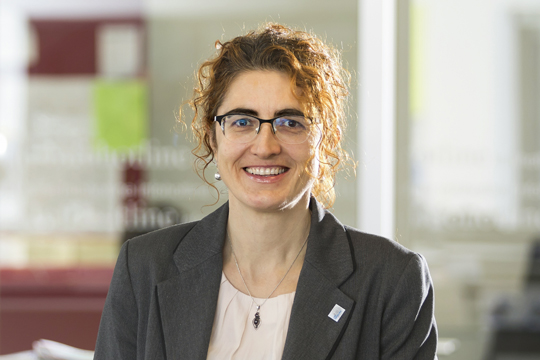Pointing the way for students
Freiburg, Nov 28, 2019
The Student Service Center (SCS) at the University of Freiburg is a “point of contact for everyone.” New and seasoned students alike receive counseling and support in all matters concerning their studies. Since the first of October, the staff of about 50 has had a new boss. With curiosity and a desire for new challenges, Kari Reulecke has thrown herself into her work. She has already completed her first work shadowing assignments to get to know the range of services: “I want to be up close and personal, otherwise I can't run a place like this.”
 New director of the Student Service Center: Kari Reulecke is looking forward to her work with the students. Photo Jürgen Gocke
New director of the Student Service Center: Kari Reulecke is looking forward to her work with the students. Photo Jürgen Gocke
How good it would have been if she herself could have started out with that much support. After four semesters of German philology in her country of origin, Bulgaria, Kari Reulecke came to the Humboldt University in Berlin in 1996 on a scholarship. It was a completely different system from what she knew. In Bulgaria, the course of studies was predetermined, the forms of teaching frontal instead of interactive. She had not learned how to choose between several possibilities. In Berlin, however, “I was flooded with offers,” she says, “more personal counselling would have helped me.” Even though the number of courses of study back then may have been even more manageable compared to the 288 offered today in Freiburg alone.
Gateway to the University
More than 24,000 students a year are administered and supervised by the Student Office at the SCS, which also offers a wide range of advisory and mentoring services. Reulecke is very pleased that the University of Freiburg has expanded its range of services for students under these changed conditions. The SCS sees it as a “gateway to the university that we want to keep open and attractive for students.” For example, with low-threshold access routes, more uniform admission procedures and soon paperless applications. “For the work to be good, we have to work together with a lot of people. We are not an island.”
Fun with managing and organizing
Reulecke has worked in many different areas so far, having stretched out many feelers into new research management and administrative worlds and having gained a wealth of experience and insights that would be of use to her in her current position. It actually began with her love of reading, which is why she had turned her attention to Modern German Literature during her master’s degree in Berlin. But to immerse herself in academia? Reulecke couldn't imagine that, even though she felt at home in the university environment. “I enjoyed working with people, managing and organizing, preferably several things at the same time.” She consistently found the right jobs to match her interests. Even though the term ‘research management’ did not yet exist, she was already practicing it at one of the institutes at Freie Universität Berlin, where she was responsible for coordinating collaborative projects. However, because her desire to head south and to the mountains was so great, she and her family eventually turned their backs on Berlin.
Energy for new challenges
At the University of Freiburg, she worked as a media assistant at the Bernstein-Center and at a collaborative research center in Biology. From the beginning she was part of the Excellence Cluster BIOSS Centre for Biological Signalling Studies, where she worked in various areas such as Assistant Manager for Finance and Personnel all the way to Public Relations and Events. Because things were running so smoothly, she yearned for more responsibility, development and new challenges. Reulecke found them as head of administration at the Institute for Macromolecular Chemistry with responsibility for the approximately forty non-academic employees, for the functioning infrastructure of the institute, as a member of the faculty board and many other tasks. Here, too, she liked it very much. But when the position was advertised, she felt a tremendous desire and energy to set off for new horizons and become even more involved in the University, thereby coming full circle, says Reulecke: “After having served in various administrative and research management roles for academics, the students are now my current focus.”
Anita Rüffer

